|
|
|
Sort Order |
|
|
|
Items / Page
|
|
|
|
|
|
|
| Srl | Item |
| 1 |
ID:
189015


|
|
|
|
|
| Summary/Abstract |
Domestic politics around the globe have become increasingly polarized along secular-religious lines. Recent literature suggests that one way to ease secular-religious tension and gridlock is for religious leaders to offer progressive reinterpretations of religious texts, that might convince religious conservatives to compromise from their seemingly-fixed policy positions. But can everyday citizens deploy religious reinterpretations themselves? We examine this question through a series of citizen debates in Tunisia, in which 602 participants attempted to reach a compromise over two ‘culture wars’ issues. Across both experiments, we find that having secular liberals engage religious conservatives with religious reinterpretations backfired, nearly halving the rate of compromise. Religious reinterpretations produced both defensive conservatives and emboldened liberals, obstructing compromise between them. While scholarship suggests that religious leaders may be able to deploy reinterpretations effectively, our results caution that everyday citizens may not.
|
|
|
|
|
|
|
|
|
|
|
|
|
|
|
|
| 2 |
ID:
172540


|
|
|
|
|
| Summary/Abstract |
What drives some Islamists to become “Muslim Democrats,” downplaying religion and accepting secular democracy? This article hypothesizes that one channel of ideological change is migration to secular democracies. Drawing on an ideal point analysis of parliamentary votes from the Tunisian Islamist movement Ennahda, I find that MPs who had lived in secular democracies held more liberal voting records than their counterparts who had lived only in Tunisia. In particular, they were more likely to defend freedom of conscience and to vote against enshrining Islamic law in the constitution. Interviews with several of these MPs demonstrate that they recognize a causal effect of their experiences abroad on their ideologies, and provide support for three distinct mechanisms by which this effect may have occurred: socialization, intergroup contact, and political learning.
|
|
|
|
|
|
|
|
|
|
|
|
|
|
|
|
| 3 |
ID:
190017
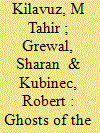

|
|
|
|
|
| Summary/Abstract |
Episodes of mass political violence, such as genocide and civil war, have been thought to both encourage and discourage future political mobilization. We square these competing hypotheses by disaggregating between protest onset and resilience. We argue that exposure to mass violence decades ago should on average decrease protest onset, by heightening fears of repression and retribution. However, conditional on protesting, prior exposure to violence should increase protest longevity, by generating greater political grievances that fuel commitment to the cause. We find evidence of both effects in Algeria during the 2019–20 Hirak protests that toppled President Abdelaziz Bouteflika. Pairing an original dataset on massacres during the 1990s civil war with a rolling online survey of 18,000 Algerians in 2019–20, we find that areas exposed to greater violence in the 1990s had on average fewer, but more committed, protesters in 2019–20.
|
|
|
|
|
|
|
|
|
|
|
|
|
|
|
|
| 4 |
ID:
165263
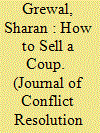

|
|
|
|
|
| Summary/Abstract |
Unlike other political leaders, leaders coming to power through military coups face a dual legitimation challenge: they must justify not only why they should rule but also how they came to power. Little attention has been paid to how coup leaders solve this legitimacy deficit and even less to the audiences of this legitimation. We ask: why do some coup leaders legitimate their coups by holding elections while others do not? Counterintuitively, we argue that coup leaders who oust democratically elected leaders are less likely to hold elections, except when tied to US military aid. We test these hypotheses through a data set of military coup regimes from 1946 to 2014 and trace out mechanisms through case studies of the Nigerian coup of 1983 and the Egyptian coup of 2013. This argument provides a new explanation for the emergence of authoritarian elections and a new perspective on the international dimensions of dictatorship.
|
|
|
|
|
|
|
|
|
|
|
|
|
|
|
|
| 5 |
ID:
167427
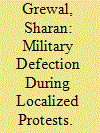

|
|
|
|
|
| Summary/Abstract |
In May 2017, the Tunisian military allowed protesters to storm and shut down an oil valve in Tataouine, in contravention of a direct order from President Essebsi to defend the production site. While scholars have recently examined military defection during mass uprisings, these protests were small and localized. Why did the military disobey President Essebsi in Tataouine? Drawing upon a survey of military officers conducted six months prior to the defection, I show that the military's composition and corporate interests, rather than its professionalism, likely prompted its defection. The majority of the military hails from impoverished regions in Tunisia's neglected interior and identifies with the demands of protesters in these regions. The military also saw the curtailment of its material and political interests in early 2017, giving it little incentive to repress protesters on the regime's behalf. Methodologically, this study provides some of the first survey data of military officers’ attitudes toward defection.
|
|
|
|
|
|
|
|
|
|
|
|
|
|
|
|
| 6 |
ID:
186043
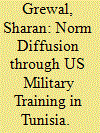

|
|
|
|
|
| Summary/Abstract |
Proponents claim that US military training diffuses norms of democracy and civilian control into foreign militaries. I argue that foreign trainees are likely to absorb the United States’ entire pattern of civil-military relations, including the more political trends that have emerged in recent decades, such as military personnel identifying with and voting for political parties, and serving in senior positions in government upon retirement. Through interviews and two surveys of Tunisian military personnel, I show that US trainees are more supportive than French trainees of active-duty personnel voting and of retired officers serving as president and defense minister. The diffusion of these more political attitudes to foreign trainees may help explain why US military training does not uniformly correlate with apolitical behavior.
|
|
|
|
|
|
|
|
|
|
|
|
|
|
|
|
| 7 |
ID:
172928
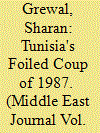

|
|
|
|
|
| Summary/Abstract |
In 1987 Tunisian prime minister Zine al-'Abidine Ben 'Ali seized power from the ailing president, Habib Bourguiba. Less well-known is that Ben 'Ali's coup had preempted another coup plot planned for the following day. This article recounts the story of this latter plot, led by the November 8th Group, a coalition of about 200 individuals in the military, security forces, and the Islamic Tendency Movement (MTI). Drawing on memoirs and interviews, the article explores the plotters' motivations, post-takeover plans, and ultimate failure. It highlights how Bourguiba's coup-proofing strategies shaped the plot and its outcome, concluding with a discussion on the foiled coup's lasting impact on Tunisian civil-military relations.
|
|
|
|
|
|
|
|
|
|
|
|
|
|
|
|
| 8 |
ID:
186321


|
|
|
|
|
| Summary/Abstract |
Civilian control of the military is central to the making of security policy, ensuring that civilian officials and the elected leaders that appoint them oversee and decide military affairs. This paper exposes a challenge to civilian control in the United States that originates in the disparaging attitudes military personnel hold toward civilian society. We argue that when military personnel view military culture as superior, they are more likely to view civilian political leaders as illegitimate and in turn to favor actions that undermine civilian control. We develop a typology of civilian control in which military officers can constrain, contest and limit civilian authority. Our empirical analysis provides strong and consistent evidence of the corrosive effects of military superiority on civilian control across three surveys of U.S. military personnel: the 1998-99 TISS survey of 2901 military officers, a 2014 YouGov of 275 veterans, and an original 2020 survey of 770 West Point cadets.
|
|
|
|
|
|
|
|
|
|
|
|
|
|
|
|
|
|
|
|
|